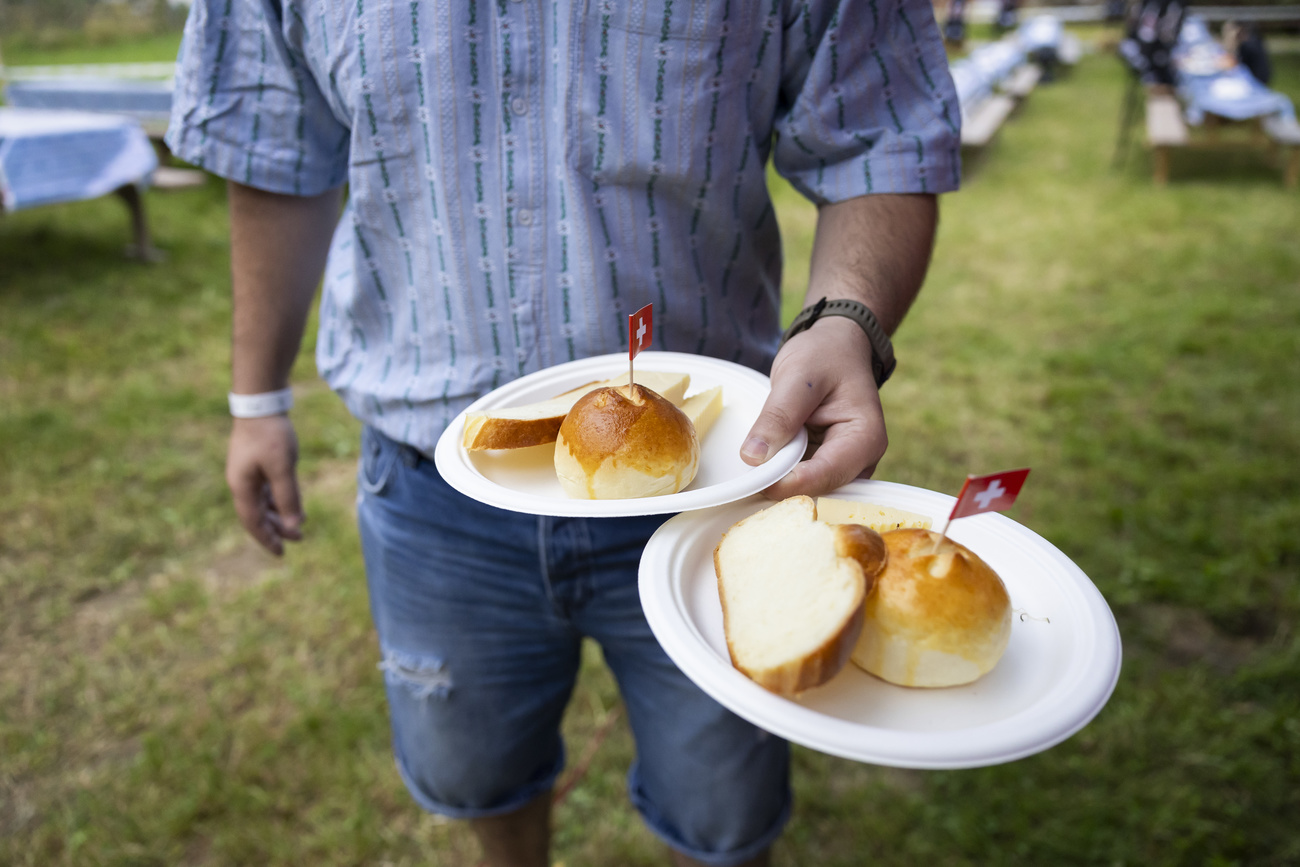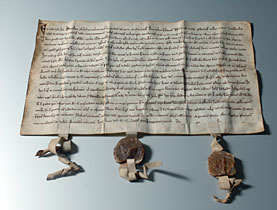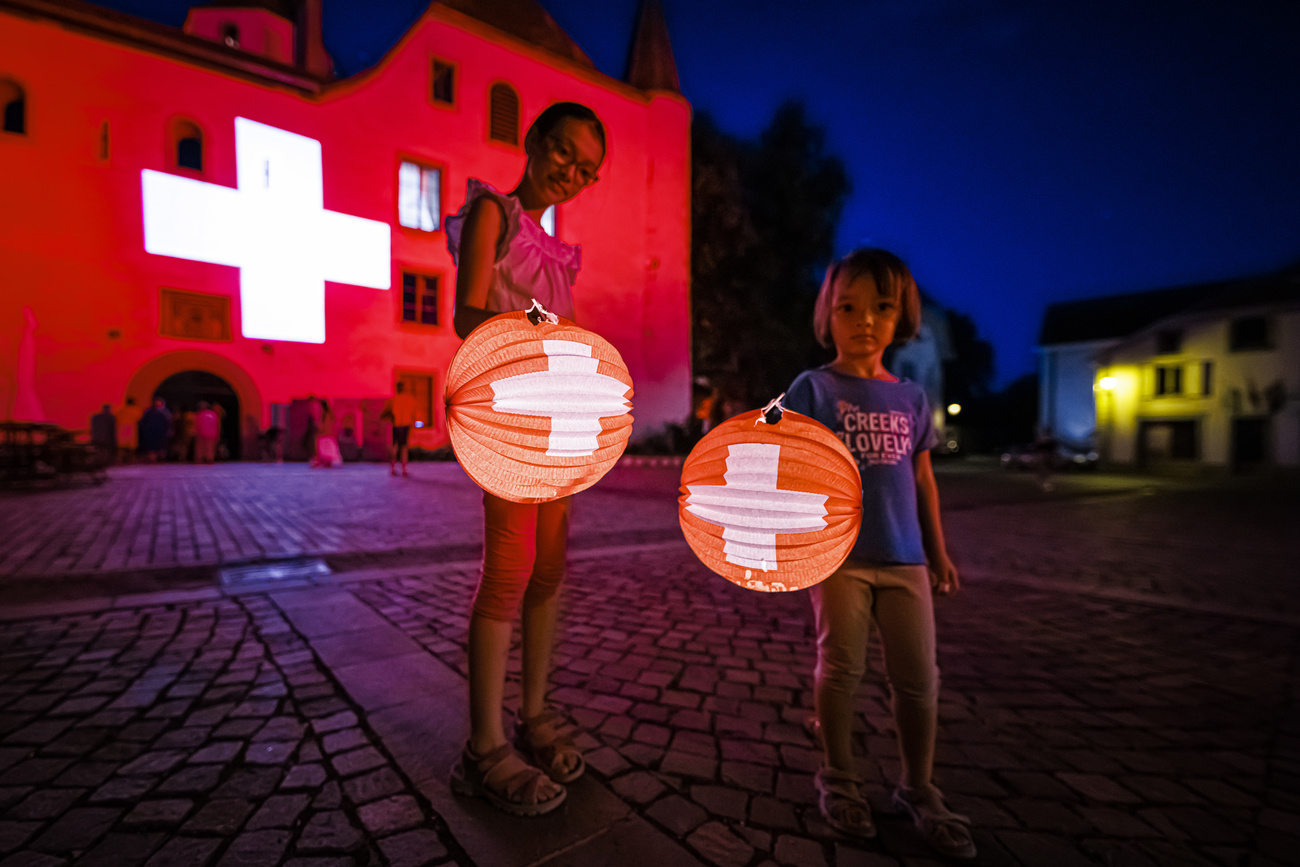
A common August 1 sight: a “Wegge” bread roll with a Swiss flag stuck in it.
Keystone / Peter Klaunzer
On August 1 each year, Switzerland celebrates its own founding with bonfires, flags, and speeches. Customs range from traditional to modern – with fireworks still a big bone of contention.
August 1, Swiss National Day, is celebrated in the country with a range of traditional customs. Some are older, some newer, and some are even a bit contrived – for example, the very date itself.
Other countries tend to set their national holiday to coincide with their founding constitution; for Switzerland, that was September 12, 1848. But in 1891, it was instead decided to celebrate the 600th anniversary of the federal charter of 1291.
Although the charter bears the year 1291, it doesn’t specify a clear date on which it was signed. The story goes that on August 1, 1291, three men met on the Rütli meadow in central Switzerland to raise their fingers in oath and found the Swiss Confederation – though this is probably more of a legend than a hard truth.
The federal charter is also a point for historical debate, as this piece from our archives shows:
More

More
Historians question federal charter
The bonfires which are traditionally lit in the mountains on August 1 meanwhile have no historical connection to the founding of the Swiss Confederation; their origins are likely to be found in the importance of high-lying watchtowers.
For example, signal fires were lit in the mountains from the 15th century onwards to warn of the approach of enemy troops. Today, the fires are simply nice to look at; for many, they also evoke a feeling of cosy homeliness.
Unlike in other countries, there is no central celebration marking Switzerland’s national holiday – let alone a military parade. The Swiss Society for the Common Good (SSCG) organises a symbolic event every year on the Rütli meadow; but in keeping with the country’s decentralised spirit, August 1 sees official federal celebrations throughout the country.
Ten pictures from ten years – how people in Switzerland celebrate on August 1:
Explosive topic
Another custom that lights up the sky on August 1 is fireworks. But this is a touchy issue: a majority of the population is opposed to rockets and firecrackers, and a people’s initiative is calling for a ban. Several regions have already outlawed them. In many places, however, fireworks still play a key role. Cities and municipalities organise displays; many private individuals also don’t miss the chance to set off a rocket or two.
Official celebrations are less controversial: here, municipalities organise events with speeches, music, and – depending on the region – flag-waving and alphorn-blowing. The seven government ministers criss-cross the country to give speeches at these events; some ministers deliver several addresses in the course of the day.
The fact that the date of the national holiday is itself somewhat flexible is also shown by the fact that many municipalities have moved celebrations to the evening of July 31. This allows people to recover from the celebrations on August 1 itself – a public holiday.
Incidentally, Swiss National Day wasn’t always a day off – this was only officially confirmed by a public vote in 1993.
Hier erfahren Sie mehr über die Gründung des 1. August:
More

More
Swiss celebrate 30 years of workfree August 1
Rural brunches
Anyone who manages to get out of bed in time on August 1 can have breakfast on a farm. These so-called August 1 brunches, hosted by farmers across the country, are a relatively new invention, having started 33 years ago. Buffets feature regional, homemade dishes, as well as traditional August 1 “Wegge” – sweet bread made from yeast dough, and decorated with a Swiss flag.
Demand for the brunches is high, but due to the effort involved in organising them, fewer and fewer farms are offering them.
Do you know the words to the Swiss national anthem? If not, you’re not the only one:
More

More
The Swiss national anthem: outdated but resilient
Alternative August 1
In addition to the classic celebrations with flags, costumes, and the national anthem, there are also alternative August 1 offerings. In Lucerne, for example, you can celebrate the nation at a “day-dance” – a techno party in broad daylight.
In Altstätten, St Gallen, a medieval festival recreates how things might have looked on August 1, 1291; in Zurich, the “Äms Fäscht” offers food and music with a more international focus. And in the border town of Laufenburg, Aargau, celebrations are international – German neighbours from just across the Rhine are also involved.
What is your opinion? Join the debate:
Edited by Balz Rigendinger; translated from German by DeepL/dos
More
















